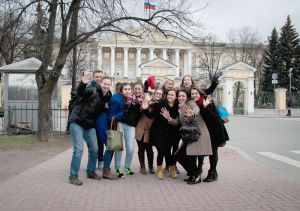How we make environmental journalism entertaining?
June 11, 2015
 The Russian-German seminar on environmental journalism took place from 20 to 24 April at SPbU. It included lectures of journalists and scientists from both countries and work on features about environmental issues in St. Petersburg.
The Russian-German seminar on environmental journalism took place from 20 to 24 April at SPbU. It included lectures of journalists and scientists from both countries and work on features about environmental issues in St. Petersburg.
"What environmental issues can you see on this photo?" - Irene Quaile-Kerstin, the editor from Deutsche Welle, asks the participants of the German-Russian seminar. She shows them a picture of a young pretty lady in swimsuit. The girl is swimming in a water partly covered with ice. The answers of German and Russian young journalists to Irene's questions are very different: from global warming to water and air pollution. Turns out - all of them are correct. The picture was taken during Irene’s expedition to Alaska and was aimed to raise awareness about global problems.
In her lecture the Head of Feature and Magazine Programming of Deutsche Welle Quaile-Kerstin shares her professional secrets with participants: how to cover environmental topics in an interesting way? She advises to use sounds of nature in radio features and to tell real stories, to show animals in TV features. But one shouldn’t get too entertaining and forget about complex issues: Irene tells about a tabloid journalist who also covered their expedition to Alaska and failed to show the environmental problems of the region: "As a result this journalist wrote about sexy girl in swimsuit, but not about ecology"!
Irene Quaile-Kerstin was keynote speaker of the seminar “Sustainable development and global issues” that took place in the end of April in Saint Petersburg. During four days young journalists visited lectures, trainings, participated in a round table and worked in international teams on their own pieces.
Practice makes perfect
The first working day of the seminar began with two lectures. Anna Litvinenko gave some practical advices on writing a feature, telling how important it is to find an interesting character, to note his or her "golden quotes" and to always pay attention to details. Angelina Davyidova talked about the trends of environmental journalism in Russia. She also named some "green" Russian media: "Ecorepoter”, "Plotina.net", "Priroda.su" and others.
Russian and German participants were suggested to create in international tandems their own multimedia features about environmental issues in St. Petersburg. There were plenty of ideas of topics: from Baltic Sea's polution to living conditions for animals in the St. Petersburg Zoo. Andrea Linder, a participant from Munich, said that practical work was the most interesting part for her: “It was a great experience to write a feature in unfamiliar city, not speaking Russian at all”.
Apart from working on their pieces participants had an excursion to the city hall – Smolny, where they visited the working room of Vladimir Lenin. Later they attended round table on ecological journalism in news agency “Interfax”.
Time of deadline came very soon. Participants together with teachers discussed and commented on every feature and shared their working experience of these three days. Journalists noticed they had too little time for producing a thorough piece, but came to conclusion that meeting tough deadlines was useful and really fascinating.
Here are the outcomes of the workshop:
Andrea Linder from Munich was really surprised to see just few bicyclists on the streets of St. Petersburg: in western European countries you can see them at every step! That's why Andrea together with the first-year student of SPbU Luiza Vafina decided to cover bicycle situation in St. Petersburg:
https://andrealindner.atavist.com/how-the-bicycle-movement-fights-in-saint-petersburg
Julia Leibetseder, who studies PR in Graz and is currently on her exchange semester in St. Petersburg, and the master student from Russia Daria Malitskaya researched about living conditions of animals in St. Petersburg zoo:
http://project6377.tilda.ws/page18157.html
To write their feature about recycling in St. Petersburg, Alexandra Elfacheva form SPbU and Elizabeth Shroeder from Berlin watched how people gathered used batteries in one of the universities in St. Petersburg:
https://lisbethschroeder.atavist.com/isnt-it-normal-to-seperate895t0
Andreas Rossbach from Bamberg and Valeria Lazareva from St. Petersburg wrote about "green places" in the city. Searching for them they went about six kilometers along the streets of St. Petersburg historic centre:
http://project6389.tilda.ws/page19425.html
Tatyana Kondratenko from SPbU and Jonas Jordan from Frankfurt covered the problem of climate change in St. Petersburg and the introduction of the climate change strategy in the city which is a unique case in Russia:
http://project6376.tilda.ws/page18349.html
Text: Luiza Vafina
Photo: Valeria Lazareva
No comments yet. Be the first!


